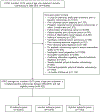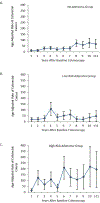Long-term Risk of Colorectal Cancer and Related Death After Adenoma Removal in a Large, Community-based Population
- PMID: 31589872
- PMCID: PMC7083250
- DOI: 10.1053/j.gastro.2019.09.039
Long-term Risk of Colorectal Cancer and Related Death After Adenoma Removal in a Large, Community-based Population
Erratum in
-
Correction.Gastroenterology. 2021 Mar;160(4):1433. doi: 10.1053/j.gastro.2020.10.012. Epub 2020 Oct 12. Gastroenterology. 2021. PMID: 33058781 No abstract available.
Abstract
Background & aims: The long-term risks of colorectal cancer (CRC) and CRC-related death following adenoma removal are uncertain. Data are needed to inform evidence-based surveillance guidelines, which vary in follow-up recommendations for some polyp types. Using data from a large, community-based integrated health care setting, we examined the risks of CRC and related death by baseline colonoscopy adenoma findings.
Methods: Participants at 21 medical centers underwent baseline colonoscopies from 2004 through 2010; findings were categorized as no-adenoma, low-risk adenoma, or high-risk adenoma. Participants were followed until the earliest of CRC diagnosis, death, health plan disenrollment, or December 31, 2017. Risks of CRC and related deaths among the high- and low-risk adenoma groups were compared with the no-adenoma group using Cox regression adjusting for confounders.
Results: Among 186,046 patients, 64,422 met eligibility criteria (54.3% female; mean age, 61.6 ± 7.1 years; median follow-up time, 8.1 years from the baseline colonoscopy). Compared with the no-adenoma group (45,881 patients), the high-risk adenoma group (7563 patients) had a higher risk of CRC (hazard ratio [HR] 2.61; 95% confidence interval [CI] 1.87-3.63) and related death (HR 3.94; 95% CI 1.90-6.56), whereas the low-risk adenoma group (10,978 patients) did not have a significant increase in risk of CRC (HR 1.29; 95% CI 0.89-1.88) or related death (HR 0.65; 95% CI 0.19-2.18).
Conclusions: With up to 14 years of follow-up, high-risk adenomas were associated with an increased risk of CRC and related death, supporting early colonoscopy surveillance. Low-risk adenomas were not associated with a significantly increased risk of CRC or related deaths. These results can inform current surveillance guidelines for high- and low-risk adenomas.
Keywords: Adenoma; Colonoscopy; Colorectal Cancer; Polyp.
Copyright © 2020 AGA Institute. Published by Elsevier Inc. All rights reserved.
Conflict of interest statement
Disclosures: No conflicts of interest exist for any of the authors.
Figures




References
-
- Lin JS, Piper MA, Perdue LA, et al. Screening for colorectal cancer: updated evidence report and systematic review for the US Preventive Services Task Force. JAMA 2016;316:545. - PubMed
-
- US Preventive Services Task Force, Bibbins-Domingo K, Grossman DC, et al. Screening for colorectal cancer: US Preventive Services Task Force Recommendation Statement. JAMA 2016;315:2564–2575. - PubMed
-
- Winawer SJ, Zauber AG, Ho MN, et al. Prevention of colorectal cancer by colonoscopic polypectomy. N Engl J Med 1993;329:1977–81. - PubMed
-
- Brenner H, Chang-Claude J, Seiler CM, Rickert A, Hoffmeister M. Protection from colorectal cancer after colonoscopy: a population-based, case-control study. Ann Intern Med. 2011;154(1):22–30. - PubMed
Publication types
MeSH terms
Grants and funding
LinkOut - more resources
Full Text Sources
Medical
Miscellaneous

